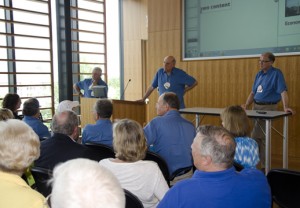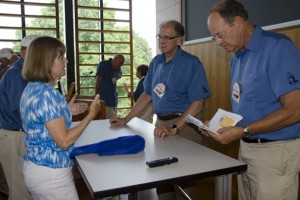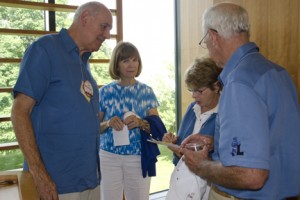By Lori McFerran

Jim Giudice ’63 (L-R), Stan Wetschler ’63, and Bert Zarins ’63 discuss the medical field.
When the three physicians who presented a Reunion College session during their 50th reunion Saturday graduated from Lafayette in 1963, medicine was entering a boom era. It was fueled by new treatments, technology, and an influx of funding from the newly passed Medicare Act.
According to Dr. Bert Zarins ’63, those events laid the groundwork for the changes now occurring in the health care system that will continue in the future. He is emeritus chief, sports medicine service, and Augustus Thorndike clinical professor of orthopedic surgery at Harvard Medical School.

Bert Zarins (center) talks with attendees.
“I’m not doing anything now that I learned as a resident,” says Zarins, addressing the nearly full Gendebien Room in Skillman Library. “Twenty years from now, the same will be true for today’s residents.”
He and fellow alums—Dr. Jim Giudice ’63, who specializes in pulmonary diseases and is director of pulmonology and chief of the resident program at University of Medicine and Dentistry of New Jersey, and Stan Wetschler ’63, who practiced internal medicine in Pittsburgh, Pa., for more than 40 years and is now retired—agree that big changes are already underway. They include the replacement of primary care physicians by “physician extenders,” those who undergo only two years of training but can perform many of the duties of doctors, and advancements in personal technology.
“People will wear a mobile wireless device much like an iPhone that will measure blood chemistry, check vital signs, and so on,” says Zarins. “The information will be stored and correlated with real-time data, so treatment will be continually updated. You won’t have to go to a doctor for medical care anymore.”
Giudice praises advances in technology in the operating room and for managing medical records, but considers them a drawback in the exam room. “Physicians spend so much time typing information on computers that we’re losing that personal connection with patients that is so important.”
How to communicate well on a personal level is something that Wetschler attributes to his education at Lafayette, and is one of the advantages, he says, the College offers to students interested in the health professions.

Stan Wetschler (left) talks with attendees.
“Students at Lafayette live in a ‘social community,’” he says, referring to fraternities, sororities, residences like the new Grossman House, and special interest houses. “These settings provide the socialization that helps you learn to connect with people. And as a doctor, that helps you connect with your patients later on.”
Another lesson that Wetschler says goes back as far as his days at Lafayette is to expect the unexpected. This came in handy when, in 1999, he was diagnosed with colon cancer. The specialists that saw him told him he had no chance of recovery, but he decided to prove them wrong.
“I changed my whole lifestyle,” says Wetschler. “I combined alternative medicine with what made sense traditionally. Statistically, I shouldn’t be here.”
Wetschler says that the unpredictable nature of most things makes personal empowerment key. He tells patients and the medical students he encounters that the only thing they can do, no matter where health care goes in the future, is to “take control of your own outcomes.”
All three encourage students to embrace technology, cultivate personal connections, and expect the unexpected.
[Editor’s note: Dr. Ray Moyer ’63, orthopedic surgeon at Temple University Hospital, Philadelphia, originally scheduled as a presenter, had to cancel due to health reasons.]



1 Comment
Comments are closed.